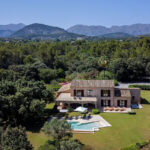This article is designed for people already familiar with Phuket real estate from a macro perspective, so we will skip the typical introduction about Phuket luxury villas and property; instead, we dive straight in and clarify some details regarding ownership considerations, ownership fees, and insights regarding investment choices and exit strategies.
Luxury Villa Ownership in Phuket
The terms ‘villa’ and ‘house’ are often used interchangeably in Phuket’s real estate market, but villas generally refer to high-end properties with private pools, high-end finishes, and premium locations – at the absolute top end of the market is Villa Mayavee in Kamala. Unlike condominiums, which can be owned freehold by foreign buyers (up to 49% of the total usable floorspace can be sold to foreign investors on a freehold basis), villas require alternative ownership structures due to Thailand’s restrictions on foreign land ownership.
1. Thai Limited Company Ownership
Foreign investors often purchase luxury freehold villas through a Thai Limited Company. In this setup:
- The company owns the freehold title to the land, precisely the title deed.
- The foreign investor(s) is typically a director of the company (there can be more than one).
- For every foreign director, there must be two Thai shareholders.
- Thai shareholders must hold at least 51% of the company, but they cannot be nominees.
- The company must be created with genuine business intent – in other words, the purpose is to generate profit, not just to be a holding vehicle for the freehold of the land.
While this method allows effective control over the property, buyers must work with legal and trustworthy experts to ensure compliance with Thai corporate law. There are also substantial running costs prospective buyers need to be aware of, including company setup costs and company administration expenses. Dividends need to be paid if the business is making a profit – of course, they should not be considered expenses as such.
2. Leasehold Ownership
An alternative to company ownership is leasehold:
- Foreign buyers lease the land for up to 30 years – the maximum term permitted under Thai residential property law.
- Some developers may offer 30-year lease extensions, typically included in the initial sales price.
- Leasehold agreements may include built-in renewal clauses, though enforcement depends on the seller’s credibility.
Leasehold tenure avoids the complexities and substantial expenses of managing a company and correctly structuring a fully compliant company but does not offer perpetual ownership.
Ownership Costs and Ongoing Fees
Luxury villas in Phuket always come with associated costs beyond the purchase price. These include:
1. Transfer and Legal Fees
Company Ownership
- In cases where a company is taken over, the costs are substantially lower because:
- No company setup costs – it is hard to give an estimate for this because it depends on the lawyer, but prospective investors should expect to budget at least 300,000 baht to set up a fully compliant company.
- No transfer fees are paid to move the asset from one company to another, solely a 0.1% stamp duty on the value of the company’s shares.
Leasehold Ownership
- Land office registration fees apply, often split between buyer and seller.
Thailand Taxes and Government Fees for Buying and Selling Property
2. Compulsory Maintenance Fees/Estate Charges
Many high-end villa developments operate within gated communities, which provide security, maintenance, and shared facilities such as clubhouses, fitness centers, and communal pools. These services come with annual maintenance fees, ranging from $4,000 to $35,000+ (for example, Samujana Villas – a luxury contemporary development in Choeng Mon, Koh Samui). Costs depend on the development’s amenities, the size of the villa, what is included in the fee, and the perceived value attributed to the branding of the project.
3. Utilities and Property Management
- Monthly costs for electricity, water, and waste disposal vary significantly depending on property size and usage. The most important point to bear in mind is that electricity costs, mainly dependent on air conditioning usage, are substantially higher when the property is rented on a short-term basis.
- Many investors hire property management companies for maintenance, rentals, and concierge services. If you want to rent the villa, you can use one of the local rental management companies. Fees are about 25% of each booking for rental marketing, invoicing, and key management. Services like villa cleaning may or may not be charged extra, depending on the rental agreement.
- Regarding property maintenance, private pool and garden maintenance can be arranged by local management companies.
Resale Considerations for Luxury Villas
While Phuket’s luxury villa market continues to attract high-net-worth individuals, resale strategies should be carefully considered.
1. Freehold vs. Leasehold Impact on Resale
- Villas owned via company structures offer perpetual ownership, making them easier to resell to discerning investors familiar with corporate holding structures in Thailand.
- Leasehold villas may be harder to resell depending on the remaining lease duration. In the case of villas sold with renewable leases, the legitimacy of the mechanism ensuring future lease extensions should be carefully evaluated.
2. High-End Market Liquidity
Luxury villas priced above $3 million tend to attract a niche market. Demand is highest for properties in prime locations such as Kamala, Surin, Bang Tao, and Nai Thon, where buyers seek exclusivity and oceanfront access.
Why Phuket’s Luxury Villas Remain a Strong Investment
Despite the complexities of ownership, luxury villas in Phuket continue to be a desirable asset due to:
- Rising property values in prime locations.
- The knowledge of discerning investors regarding Thailand’s corporate holding structures.
- Strong rental yields, especially for beachfront and sea-view properties.
- A globally recognized luxury property market, continually growing and attracting high-net-worth buyers from around the world.
- The proliferation of branded real estate.
Final Thoughts
For investors looking to own a luxury villa in Phuket, understanding ownership structures, ongoing fees, and resale factors are key. For both Limited Company or a leasehold ownership, working with the highest-calibre real estate agents and lawyers is critical.



